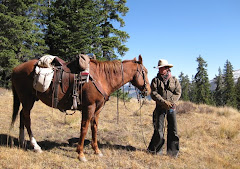 I try to ride all the time. All the time I am in the saddle or on a horse, that is.
I try to ride all the time. All the time I am in the saddle or on a horse, that is.In the last post, “riding all the time” was mentioned as one of the key points to stress for a rider. I don’t know about you, but this is a big challenge for me, but one that has been key to improving my knowledge of my horses, my riding ability, and my safety.
I’ll start by explaining this a little more. By saying “riding all the time,” I mean paying attention to you and your horse the entire time you are in the saddle (even more so when on a horse bareback). As you can imagine, running dude string rides, more often than not, we used to see folks get on the horse and expect to sit. And they figured they’d be safe. They weren’t. Wrecks were all too common. At the very least, horses would “behave badly” because of miscommunication from the rider, lack of direction from the rider’s focus, seat, legs, hands, weight, balance and voice.
We started reminded folks that riding is a sport, and they are a participant, not a passenger. This seemed to be one of those “Ah ha!” points, as you could see the rider suddenly sit up and look around more intently. I don’t know how to explain it, but I could see the difference. The rider was paying more attention. That’s the first step.
For me, striving to ride all the time, means paying attention to my self, my horse, and my surrounding (which often includes a string of dude horses or packs behind me) as much as I can. I say that somewhat loosely, because my “job” (hard to call this work when I love it so much) entails being on the trail for hours at a time, often 2, or 6 or 10 hours a day. I’m not mentally capable of paying attention for that long. But I do try. I’ll let myself get lost in the rhythm of the horse walking up the trail, and then POW! I wake up, notice where I am and what I’m doing. I take a minute to make certain I am moving with my horse, working with him. I’ll focus on my seat, check my reins, adjust my shoulders, see what feels good to me and what I can tell works for the horse. I watch his ears. They give me a good clue if he likes what I’m doing or is getting annoyed with me. I’ll even play games, like seeing if I can lead him in a certain direction, around a bush or rock, just with my focus. Or speed him up or slow him down just with the movement in my pelvis.
And then, chances are, something will distract me, usually some trivial thought, and my mind wanders away from my horse.
Quattro has been a terrific teacher to keep me focused on my riding, to keep me riding all the time. Even after hours and hours on the trail, he will not give me five minutes of my mind wandering off before he says, “Oh, there she goes, not paying attention. Let’s try THIS!” And he’ll jog, or veer off the trail, or take a bite (of grass or of the horse closest to him). He’s got a big bag of tricks, and he loves to try them all. I’ve been guiding on him for three years now. I love it. For all the hours we’re on the trail, I can never say I’m bored. Usually, if anything, I’m exhausted. Paying attention as much as he requires of me wears me out.
My sweet, gentle broodmare, Tres, has been a surprisingly good teacher for helping me learn to ride all the time. But in a very different way. You see, with Tres, I figured I didn’t have to ride all the time. I could sit back and enjoy the ride. Slack off, you know. What’s she going to do? Right? Wrong. She’s a horse. Horses are all capable of spooking, shying, bucking, rearing, biting, running off, etc… though we teach most not to behave this way, most of the time. But we should never kid ourselves that they can’t or they won’t. Because that’s when they will.
So it is that I’ve fallen off Tres more than any other horse we own or have owned. Simply because I stop riding when I’m still in the saddle. I forget where I am, what I’m doing and allow my mind to wander off, far away. I have complete trust in this mare. And I still do, even though I’ve found myself on the ground beside her a time or two. The fault is not hers. The fault is mine. Every time, I was lost in thought, and just going along for the ride, and suddenly, she’d act a like a horse and spook. What a surprise!
Last year I finally figured it out. I tried to pay attention when riding Tres, to be as aware of myself and her and the trail as I am when I ride Quattro. It was harder with Tres, because she’d so rarely “act like a horse.” But when she did, and of course she did, I was actually ready. And rather than finding myself on the ground looking up at her like “what is wrong with YOU?” I found myself solidly in the saddle, and could pat her shoulder, and say, “good Lady, you saw that before I did!”





